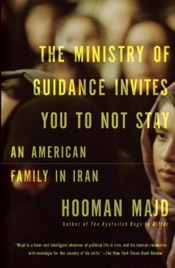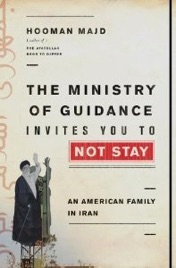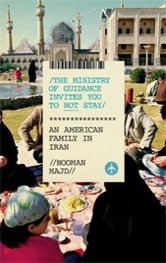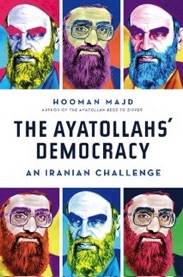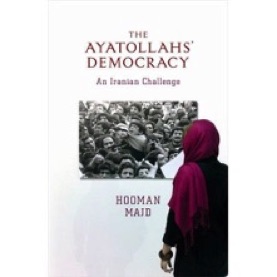"Hooman Majd is a stylish and engaging guide through the by-ways of Iranian life. Leading us from seminary to opium den to the presidential compound, his wry sense of humor makes this book a pleasure to read."
GARY SICK, Ph.D., Senior Research Scholar at Columbia University and member of the National Security Council staff under Presidents Ford, Carter and Reagan
“In this delightful book, Hooman Majd, a gifted storyteller, takes us on a tour of his own private Persia, which is also the Iran of Mahmoud Ahmadinejad. The results are illuminating, umorous, sobering, and ultimately reassuring.”
JON LEE ANDERSON, author of "Che Guevara: A Revolutionary Life" and "The Fall of Baghdad"
“Imagine if Alexis de Tocqueville had returned from America to France and then, with the gimlet eye of a native son who’d spent years abroad, explained his oft-misperceived country to the world. That’s what the ever wise and witty Hooman Majd has accomplished in his captivating new book that is sure to become essential election-year reading for anyone wanting to understand the paradox that is Iran (as well as America) in the post-Bush world.........” GQ, October 2008
“The Ayatollah Begs to Differ is a refreshing and mind-opening book, a nuanced and informed portrait of one of our most misunderstood global neighbors. It casts an arc of understanding from the Middle East to the Midwest—and, let us hope, from Tehran to Washington, D.C....” National Geographic Traveler, October 2008
“For anyone trying to get a deeper perspective on Iranian society and the future of the relationship between Iran and America, this book is an excellent place to begin. While the negotiating positions of their governments may seem intractable at the moment, The Ayatollah Begs to Differ demonstrates that America and Iran have, however improbably, a great deal more in common than one might expect. Both would prefer to see Iran become a member of the mainstream international community. It would be overly simple to say that it's only a matter of translation, but having a translator like Hooman Majd is a prerequisite to bridging the divide....” Asia Times, September 27, 2008
“Many recent books have attempted to elevate our shallow understanding of Iran, but this book soars above them as a discerning guide to a complex country.” The Christian Science Monitor, October 24, 2008
“Hooman Majd's "The Ayatollah Begs to Differ: The Paradox of Modern Iran" is perhaps the best book yet written on the contradictions of contemporary Iran........Part memoir, part travelogue, part cultural criticism, "The Ayatollah Begs to Differ" captures like no book in recent memory the ethos of the country, in elegant and precise prose.” The Los Angeles Times, November 23, 2008
“Majd's Iran is a land where ayatollahs criticize each other and young people flout rules about wearing chadors. It's a land where Majd—who makes no secret of his admiration for the reformist President Mohammad Khatami—could go on to serve as the official translator for Khatami's successor and archrival, Mahmoud Ahmadinejad, when the latter visited New York in September. But Majd is no Iran apologist: he ridicules Ahmadinejad's officials for their Holocaust deniers' conference in 2006. Majd's subtle central point is that "the lack of meaningful relations between Iran and the United States … has brought little advantage to either nation." With a new U.S. president who may be willing to talk, and Iranian leaders who have tentatively welcomed that proposition, Majd's timing is as impeccable as both his Farsi and his English.” “Worth Your Time”, Newsweek International, January 5, 2009
“This book is a vital antidote to both the wishful thinking of exiles who declare the Islamic Revolution's inevitable doom and to the exaggerated alarm of those who see it as an existential threat to the world order. It also provides some very American clues to understanding the Iranian experience.” The New York Review of Books, January 15, 2009
“Mr. President, if you are serious about negotiating with Iran, you need a guidebook on Iranian culture so that you can tell when "yes" means "no," when "no" means "maybe," and when "Death to America!" means "Please, let's talk." May I suggest The Ayatollah Begs to Differ, by Hooman Majd? An Iranian American who lives in the States and has advised and translated for both current President Mahmoud Ahmadinejad and former President Muhammad Khatami, Majd has written perhaps the best book on contemporary Iranian culture and all of its complexities and contradictions. Don't go to Tehran without it.” Washington Monthly, “What Obama Should Read”, by Reza Aslan, January/February 2009
“....Hooman Majd offers a more conversational way into the history of Iran in The Ayatollah Begs to Differ, with anecdote, colour and paradox splashed over a contemporary canvas. His is a genial and companionable book. American citizen and grandson of an ayatollah, Majd is well placed to provide a privileged glimpse into Iran and Iranians. Whether asking theo-bureaucrats faux-naïve questions or smoking opium with mullahs in Qom, après-ski partying with the secular elite or discussing a dissident’s hunger-strike at the Bobby Sands burger joint in downtown Tehran, he captures the ambiguity and plurality of today’s Iran, roundly refuting the widespread notion that it is totalitarian. He depicts this “culture that is, it’s true, proud beyond the comprehension of most westerners”. He conveys brilliantly the weird mix of breast-beating and vulnerability, the superiority and inferiority complexes that inform popular and political culture. Westerners who tend to seek out only Iranians who talk and think like themselves should use this as a guide. Majd is also superb at taking the real measure of Iran’s contemporary institutions – a bewildering blur of men in turbans to most outsiders – and at identifying the material as well as spiritual interests of, for example, the Revolutionary Guards or Pasdaran.” Financial Times, April 25th, 2009
“......What makes the book urgent now, however, is its peculiar angle of vision. In addition to his journalism, Majd has worked as a translator and consultant to Mohammad Khatami, the reformist former Iranian president; the author’s family has roots in Khatami’s home town, and the pair are related, in the usual tangled way, by cousin-level marriages. Majd is largely uncritical of Khatami and other reformists, and seems—from a very wry distance—to identify with their views of Iran’s place in the world. It is rare to have this perspective delivered in English with such richness and nuance—it is a perspective quite distinct from the reportorial assembly work of Western reporters or the pained laments of Iranian exiles. Among other things, Majd delivers a dyspeptic view of North Tehran’s globalized élite (although the author seems almost entirely secular himself) and of what he sees as the Los Angeles diaspora’s delusions of grandeur and counter-revolution. One may disagree (as I do) with some of the credulity about the Khatami-networked reformers on display in these pages, but the author’s tone is generally skeptical and independent, and his carefully observed case against the assumptions of the regime-change crowd in the West is a very important contribution; one hopes that American policymakers will take the time to absorb this book, even if some of them ultimately wish to argue against its assumptions.” The New Yorker, August 13th, 2009
“Hooman Majd is like a dashing character in a Graham Greene novel. The son of an Iranian diplomat and a grandson of an ayatollah, he was educated in America and Europe.......Majd's cosmopolitan perspective permeates his book, "The Ayatollah Begs to Differ," an impressionistic collection of reporting, memoir, travelogue and commentary.” The Washington Post, August 26th, 2009
Los Angeles Times: “Favorite books of 2008”
The Economist : "One of the bestbooks of 2008"
